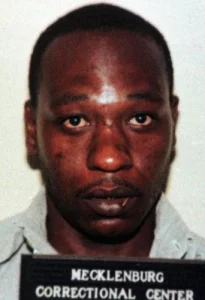Tony Mackall was executed by the State of Virginia for the murder of Mary Dahn
According to court documents Tony Mackall would rob a gas station where he would shoot and kill the cashier Mary Dahn. Later the same night Mackall would shoot a man during the theft of his vehicle, the man would survive
Tony Mackall would be arrested, convicted and sentenced to death
Tony Mackall would be executed by lethal injection on February 10 1998
Tony Mackall Photos

Tony Mackall Case
Virginia carried out its first execution of the year tonight, putting to death Tony A. Mackall, who was convicted of fatally shooting a Prince William County gas station cashier during a 1986 holdup.
Mackall, 33, was pronounced dead at 9:10 p.m. at the Greensville Correctional Center after asking the relatives of the woman he killed to “please forgive me.”
He was the 47th death row inmate executed in Virginia since the death penalty was reinstated in 1976.
Gov. James S. Gilmore III declined tonight to act on Mackall’s petition for clemency. On Friday, the U.S. Supreme Court denied a stay of execution for Mackall, exhausting his court options.
In November 1986, Mackall fled from a District halfway house where he had been serving a burglary sentence. Less than two weeks later, on Dec. 9, Mackall robbed and murdered Mary E. Dahn, 31, who worked with her husband at the Riverview Shell station in the Woodbridge area, authorities said
Her husband, Stephen Dahn, and two young daughters were decorating the gas station for the holidays and Dahn was working the cash register when Mackall entered the store, demanded money, got $515 and shot her in the head, authorities said.
After killing Mary Dahn, Mackall drove to a nearby town house development and shot a man twice in the head while trying to steal his car, authorities said. Michael Keating, then a Washington Times sports editor, survived and testified against Mackall.
A Prince William jury sentenced Mackall to death in December 1987. His lawyers have been appealing since 1988, arguing that he suffered severe mental and physical trauma as a youth and had a low IQ. Mackall’s attorney, Joseph Bowman, said Mackall grew up in the District but spent most of his childhood in a juvenile institution
Bowman argued that the jury might not have sentenced Mackall to death if it had received information about his troubled childhood. But Prince William County Commonwealth’s Attorney Paul B. Ebert, who prosecuted the case in 1987, said the jury had a clear picture of Mackall when it imposed the death sentence.
Before going to the death chamber, Mackall knelt at his cot and prayed, Bowman said.
According to Corrections Department spokesman Jim Jones, Mackall gave a brief statement just before being executed, addressing himself “to the family of Mary Dahn,” saying, “I am sorry for what I have caused. I ask for you to forgive me. I know it’s a hard thing to do, but I can only ask.”
He said to her children, April and Julie, that he knew “it was a hard thing to grow up without a mother.” The children were 5 and 4 at the time of the killing. The spokesman said Mackall also apologized to Keating and asked his forgiveness
Expected to witness the execution were Mary Dahn’s daughter, April, now 16; April’s great-aunt Jane Graham; and Graham’s sons, Jamie and Jeff. Graham has custody of April and her sister Julie, 15. Stephen Dahn, who remarried, is a long-distance truck driver who lives in Stafford County. He also had been expected to witness the execution. However, an official spokeswoman declined to identify the witnesses.
About 20 death penalty opponents held a candlelight vigil outside the prison. Staff writers Spencer S. Hsu and Leef Smith contributed to this report







